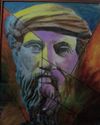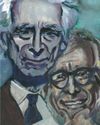
The media we consume can be a means to vicariously experience emotions through fictional characters. The anger and hostility we so often bottle up in our daily lives can rear their ugly heads without consequence as we watch fictional characters enacting violence and hatred upon one another. This is part of the surface level draw of films, books and TV series centered around the mafia. It can be deeply cathartic to watch people so far from our social expectations engage with each other according to their own very different rules. Real mafia figures such as John Gotti and Al Capone gained near-heroic status not simply because they organised what people viewed as benefits to the community, but also because those who did behave within societal constraints wished at some level they could be like these figures. If the ideal of the mafioso can seem liberating to those stuck in mundane lives, it is no surprise that media centered around the mafia has become so popular.
David Chase’s acclaimed TV series The Sopranos (HBO, 1999-2007) could reasonably be lumped in with this trend, but that would be to miss what elevated the series above other such works. Alongside its style, dialogue, and characters, The Sopranos was willing to be about something – often several somethings. Nearly every facet of the series necessitated contemplation about the wider world of which the Soprano crime family was a microcosm. It did this primarily through creating a certain affection for characters the show would simultaneously depict as immoral. While the characters of The Sopranos are fictional, the world they inhabit is not, and if the depraved members of the Soprano and Lupertazzi families seem farfetched, they may have more of a connection with the landscape of modern America than one might realize at first glance.
هذه القصة مأخوذة من طبعة August/September 2023 من Philosophy Now.
ابدأ النسخة التجريبية المجانية من Magzter GOLD لمدة 7 أيام للوصول إلى آلاف القصص المتميزة المنسقة وأكثر من 9,000 مجلة وصحيفة.
بالفعل مشترك ? تسجيل الدخول
هذه القصة مأخوذة من طبعة August/September 2023 من Philosophy Now.
ابدأ النسخة التجريبية المجانية من Magzter GOLD لمدة 7 أيام للوصول إلى آلاف القصص المتميزة المنسقة وأكثر من 9,000 مجلة وصحيفة.
بالفعل مشترك? تسجيل الدخول

FALLING DOWN
Thomas R. Morgan considers how personal identity is maintained, and how it is lost.

Pythagoras (570-495 BCE)
Daniel Toré looks beyond the mathematician to the philosopher.

Wordsworth & Darwin
Christine Avery wonders whether poetry can help us to deal with science.

Plants & Philosophy
Caroline Deforche sees similarities between gardening and philosophising.

Dr.Gindi sculptor, has a philosophical conversation with Richard Baron about sensation, life, infinity and, you guessed it, sculpture.
Dr. Gindi is one of Switzerland's foremost sculptors, whose work has been exhibited in many countries.

Thomas Aquinas on Extraterrestrial Life
Babatunde Onabajo tells us why Aquinas did not believe in aliens.

The Fire This Time
Tim Madigan on Ray Bradbury, Bertrand Russell and Fahrenheit 451.

Trust, Truth & Political Conversations
Adrian Brockless wants a recognition of human value in political debate.

Philosophy & The Crown
Vincent Di Norcia on monarchy and stability.

Technologists & Ethicists
Stephen L. Anderson laments inadequate moral insight among tech leaders.